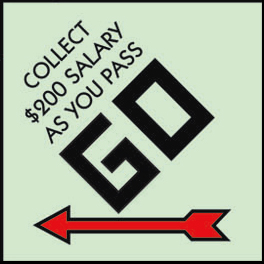In the past two days, I’ve been referred to twice as a gateway of sorts to the publishing world. Two friends each contacted me regarding friends of theirs who have written a book (or books) for children. These friends of mine asked if I would meet/advise/consult/critique/etc their friends’ work.
I have yet to speak to either of the two writers, just our mutual friends. But I’m relatively confident this is the first time either writer has stepped outside their circle of family and friends regarding their writing.
So what should I tell them? I’ve written posts before about where to begin, but I really don’t want to overwhelm anyone. I want to educate, give a dose of reality, but ultimately inspire them?
What if I could find 5 articles or websites they could go to as that starting place?

Here are my five:
- Start with Jennifer Laughran’s Word Count Post. It’s not impossible to get a 3,000 word picture book published in today’s market … no, actually it is. Get the disappointment over with first. You’re 15,000 word Young Adult novel just isn’t long enough. Let’s rip off the band-aid and move on.
- If you’re still with me and haven’t cried yourself to oblivion (or your word count is actually in line with the genre for which you’re writing), then GREAT! Let’s make sure your craft is as good as possible. There is no single link that will help make this happen, but if you join the Society of Children’s Book Writers and Illustrators, you’ll be able to find workshops, critique groups, conferences, retreats, and more -> and that will help you hone your craft. So the second link is to Join SCBWI.
- If you’re confident your manuscript is the best it can possibly be, it’s time to find somewhere to send it! Whether you are sending directly to publishers or looking for an agent, try to find a copy of the most recent Children’s Writer’s & Illustrator’s Market and SCBWI The Book. These will help you find out about which publishers are looking for what, as well as the agents looking for whom.
- But don’t send yet. You still need to write your query. What’s a query, you ask? A query is the professional business letter you send to the agent or editor ‘asking’ if they would like to read your manuscript (oh, I get it? asking=querying). How do you write one? I suggest starting at AgentyQuery.com. There are links from there to other sites, which will link to others, which link to an unending list of others – all filled with help writing queries. Querying is hard. But you will survive.
- Now that you have some sense of what you’re in for, read Delilah S. Dawson’s 25 Steps to Being a Traditionally Published Author. First, it’s hilarious. Second, it gives an exciting account of a success story. Third, it truly goes through every step of the trail to publication – highs, lows, and in-betweens.
I think that’s enough to fill anyone’s brain for a little while. If you had just 5 links to give someone starting out in the writing business, what would they be?

Finding a trusted group of ßeta Readers is essential. Without thorough, respectful feedback you have no idea if your ideas have translated well onto paper/pixels. They can, initially, be as hard to find as gold, but they’re worth as much as gold once you find them.
Reading all (and I mean ALL) of the archived posts at QueryShark.blogspot.com is essential for understanding what makes a good/bad query letter.
I’m not a member of SCBWI and my initial membership left me with a more-than-questionable opinion of the organization. If it worked for you, that’s great. To offer another opinion, I think you can find an agent and get published without joining — especially if, like me, the cost of membership is prohibitive. (There is a balance in a writer’s life between writing and activities that support one’s writing. Finding, cultivating, and encouraging/actively participating in a group of fellow writers must be part of that support system, imho.)
— Tom
LikeLike
I guess, as far as SCBWI goes, it’s sort of a one-stop-shop that encompasses a lot of things (potentially aiding in both craft, networking, and advancing a career – at least for me). I’m lucky that the New England region is flush with so many resources…
LikeLike
I encourage anyone who is actively trying to get published in the children’s market to join the SCBWI. I have had nothing but positive experience with the organization. Did my publisher care that I was a member? Probably not. But they cared about the work that I submitted which benefited from the conferences and connections I made through the SCBWI?
LikeLike
I don’t think I can make a top 5 list without lots of careful thought, but I definitely recommend the aspiring children’s book writers read through Tara Lazar’s blog http://taralazar.com/. Particularly in November (aka PiBoIdMo) when each day features a writing prompt or “path to publication” story that helps put the biz in perspective.
LikeLike
Tara’s site is great, especially for picture books. I totally agree.
LikeLike